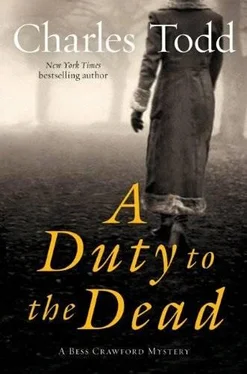And I’d just missed my chance to ask Ted Booker about Peregrine Graham.
I next expected the rector to ask me what I thought of my patient, but he didn’t. It was the journals that were on his mind. I could see that he was fascinated by his predecessor.
“Well, water under the dam,” he went on. “I’ve never spoken to anyone else about the journals, you know. It seemed best. There are comments in there that are more honest than most people could stomach. Mr. Craig believed in the truth at any price.”
“I understand.” I wasn’t to chatter about them.
“I think you do. Thank you.”
We had reached the far gate of the churchyard. He opened it for me, and said rather shyly, “Perhaps you’ll call at the rectory, before you leave. I’d be glad to show you the journals.”
“I should be leaving shortly. I’m awaiting my orders now. With Britannic at the bottom of the sea, I’m sure London is at sixes and sevens trying to decide where to put all of us. One of the nurses on the ship with me has just been posted to Poona, in India.”
“That’s a long way from home,” he said.
I didn’t tell him I’d spent part of my childhood in the East. I simply agreed, and he said good-bye, but then called me back to ask, “Do you think Peregrine Graham lacks spiritual comfort where he is? Is he capable of recognizing his needs in that direction?”
“I think,” I responded slowly, “that he despairs of comfort. But it’s a matter you must take up with the family. Or the doctors at the asylum.”
“Mr. Craig was also chaplain there, but I’ve not been asked to fill his position. Perhaps I ought to speak to someone in charge and see what the need is.”
“Yes, that might be wise,” I said. “Good-bye, Rector.”
We shook hands, and I turned away to walk the rest of the way alone.
There was much curiosity at the house regarding my summons to speak with Ted Booker. Susan was the first to ask, and then over our meal, Mrs. Graham brought up the subject.
Not wanting to add to any gossip about his attempt to kill himself, I merely said, “He felt that I’d been closer to the war than his family. I think he wanted reassurance that his problems are not his alone.”
“I should think a rational man would do his best to heal quickly and return to the fighting. God knows, we need soldiers.” Would she have wished her own son back before his time was up?
I could have answered that it wasn’t surprising-the casualty lists continued to be unbearably long. But I said instead, “It takes time to heal the mind, just as it does the body.”
“Did he ask you about Peregrine?”
“About Peregrine? I don’t believe he even knew your son was at home, ill.”
“No, I meant Dr. Philips.”
I think my guilty conscience for having spoken of Peregrine with the rector must have shone in my face, but I said resolutely, “He complimented me on my skills.”
“You needn’t avoid the question, you know.”
“But I’m not. He did tell me he’d called, to see if I needed his help. I wish I’d known it at the time.”
She nodded. “Thank you for your honesty. And I’ll be equally honest in return. I didn’t wish people in Owlhurst to gossip about my son. I’m well aware that a medical man must keep matters concerning his patients in strictest confidence, but I don’t know Dr. Philips that well yet.”
Timothy came in just then and said, “Did you hear? Booker tried to slash his wrists. Fool that he is. His wife must be in despair.” He sat down to take his tea, and then too restless to be still, stood up and carried his cup to the window.
“She made her choice, Timothy. It’s not for you to judge her decision. I’ve always felt one of the Loftlan girls would be more suitable. We could invite the family to dine with us…”
It must have been an old argument, because I saw Timothy twitch one shoulder, as if trying to shrug off her words.
“I’d just like to think she’s happy,” he said brusquely. “More to the point, safe.”
“How can she be, under the circumstances?” Mrs. Graham turned to me. “Sally was quite popular. Everyone liked her, and she had a sweet nature that I thought spoke well of her upbringing. She and Ted Booker were an excellent match. Everyone was pleased for them.”
“She saw him in uniform, and that was that,” Timothy added sourly.
Jonathan came in, late as usual, and said, “Sorry,” to his mother, before nodding to me.
Taking his cup, he said, “There was a message from the asylum. Brother Peregrine made the journey back safely. I don’t know who is more disappointed in that, the asylum or us.”
“Jonathan!” his mother said sharply.
“What sort of life does he lead, Mother? I’d hate to be caged up. And if he complains, it’s Maidstone instead. The poor devil could live to be eighty in that place. Is that what you want for him?”
“Do you think prison would have been better? Do you want that on the family escutcheon?” Timothy asked from the window.
Jonathan wheeled on his brother. “Peregrine is an albatross about our necks, alive or dead.”
“Jonathan.” His mother spoke his name in such a cold tone that both of her sons stared at her. “We’ll hear no more about Peregrine, if you please. The matter is closed.”
“Yes, well, he’s still Father’s heir when you die, Mother. We haven’t got round that problem yet, have we?”
“Peregrine could well outlive us all,” she told him. “As you said. Which reminds me. Someone needs to bethink themselves of a guardian for him, if anything happens to me.”
Jonathan said only, “Let Timothy see to that. I’m not setting foot in that place.”
“Don’t ask me to go. That’s why we have a family solicitor,” Timothy retorted.
I sat there in embarrassed silence, trying to pretend I wasn’t hearing such a private family issue being discussed.
Robert came in to speak to Mrs. Graham. He stood there, leaning against the doorframe, as if he belonged in this room and was not happy at being excluded. Remembering his gruffness when he met my train, it occurred to me that he hadn’t wanted me to come to Owlhurst. He was close to this family-it was possible that he’d guessed what Arthur would say on his deathbed, and knew it would open old wounds. Even I could see that Robert felt free to express his views. His had been the deciding voice in allowing Peregrine to come home to die.
Watching him there as he and Mrs. Graham discussed a problem with a tenant’s cow, I was reminded of what Peregrine had said about who might have killed his father-his stepmother or her cousin. It was hard to give credence to his words-they hadn’t married, after all, and I couldn’t think of another reason for killing a husband. Yet they were close, as cousins sometimes are. Clearly the two of them were of the same mind in this problem with the cow, and Robert had come out of duty rather than from a need for guidance.
When they had settled on a course of action regarding how to treat the animal, he nodded to me and left.
Mrs. Graham’s gaze followed him to the door, a frown between her eyes.
Then she turned back to me and said, “You’ve heard us speak of things that are private, my dear-in regard to Peregrine. I must apologize. But his circumstances make it necessary for us to think and act for him, painful as it may be.”
Was she testing me again, to see if I’d noticed-or failed to notice-something in regard to her stepson?
It dawned on me that perhaps the talk about Peregrine’s mental deficiency during his childhood might have been the family’s way of covering up something worse. Better to tell friends and neighbors that the boy was slow than that the boy was dangerous. It explained too why I’d not found him deficient-if anything, articulate and sensible.
Читать дальше












